How to know if baby is too tired or not tired enough. Do you need to extend baby wake time length or shorten it? Find out here.

One of the most important tools to getting baby to sleep well is understanding your baby’s optimal waketime length.
This means that you get baby down for the nap at the right moment. Timing the nap correctly will mean that baby takes a full nap and falls asleep easily.
If you get wake time wrong, you can have a baby who will not fall asleep, takes a short nap, and/or cries.
>>>Read: Optimal Waketime Lengths
So you know that if baby has correct wake time length, she will go to sleep with little to no crying, nap as long as she should, and falls asleep quickly.
You will also find that if you have waketime length down correctly, your baby will wake up from naps happily and be content and happy during playtime.
Post Contents
- Is Baby Overly Tired or Not Tired Enough?
- Signs Baby is Overtired
- Signs Baby is Undertired
- Overtired vs. Undertired
- Look at Disposition
- Look at History
- Look at Sleep Patterns
- What To Do If You Have an Overtired Baby
- Swaddle Baby
- Get Wake Windows Right
- Set Up a Solid Sleep Routine
- Limit Stimulation for Your Baby
- Use Sleep Props to Calm, Comfort, and Get Baby to Sleep
- Conclusion
- Related Posts
Is Baby Overly Tired or Not Tired Enough?
The big question comes when the above are not true. If baby is having a hard time falling asleep, taking short naps, and discontent during playtime, does that mean your baby is overtired or undertired?
Should you be extending waketime length or shortening it?
You know something is wrong, but you aren’t sure how to fix it.
Signs Baby is Overtired
When your baby is overtired, then what has happened is cortisol has built up in the system. Cortisol acts like a drug to keep you awake.
The problem is, sleep begets sleep. The inverse is true. Lack of sleep leads to more lack of sleep.
Here are some signs of an overtired baby:
- Baby cries a lot
- Baby is hard to calm down
- Baby is taking a short nap
- Baby is waking early in the morning
- Baby is discontent during playtime
- Baby cries a lot when going down for a nap and will fight sleep
- Baby does not sleep well in general
>>>Read: How To Calm Your Overstimulated Baby
A couple of notes here. Some short naps are normal. They happen. We are looking for consistent short naps, not every once in a while.
Babies are also notoriously fussy in the evenings. You might also have a baby who experiences the witching hour. So not all of these signs mean that baby is absolutely overly tired. There are so many factors to consider.
>>>Read: How To Manage Baby’s Dreaded Witching Hour
See the section below for help with what to do when your baby is overtired.
Signs Baby is Undertired
Sleep will not go well if baby is not tired enough, also. The question becomes how do you tell if baby needs more or less wake time?
Here are signs baby is undertired:
- Baby takes a long time to fall asleep
- Baby starts playing in the crib rather than sleeping
- Baby takes short naps
- Baby does not sleep well at night
- Baby wakes early in the morning
Sooo….you may have noticed that a lot of the signs are the same for the two categories.
Finding optimal waketime length is not easy!
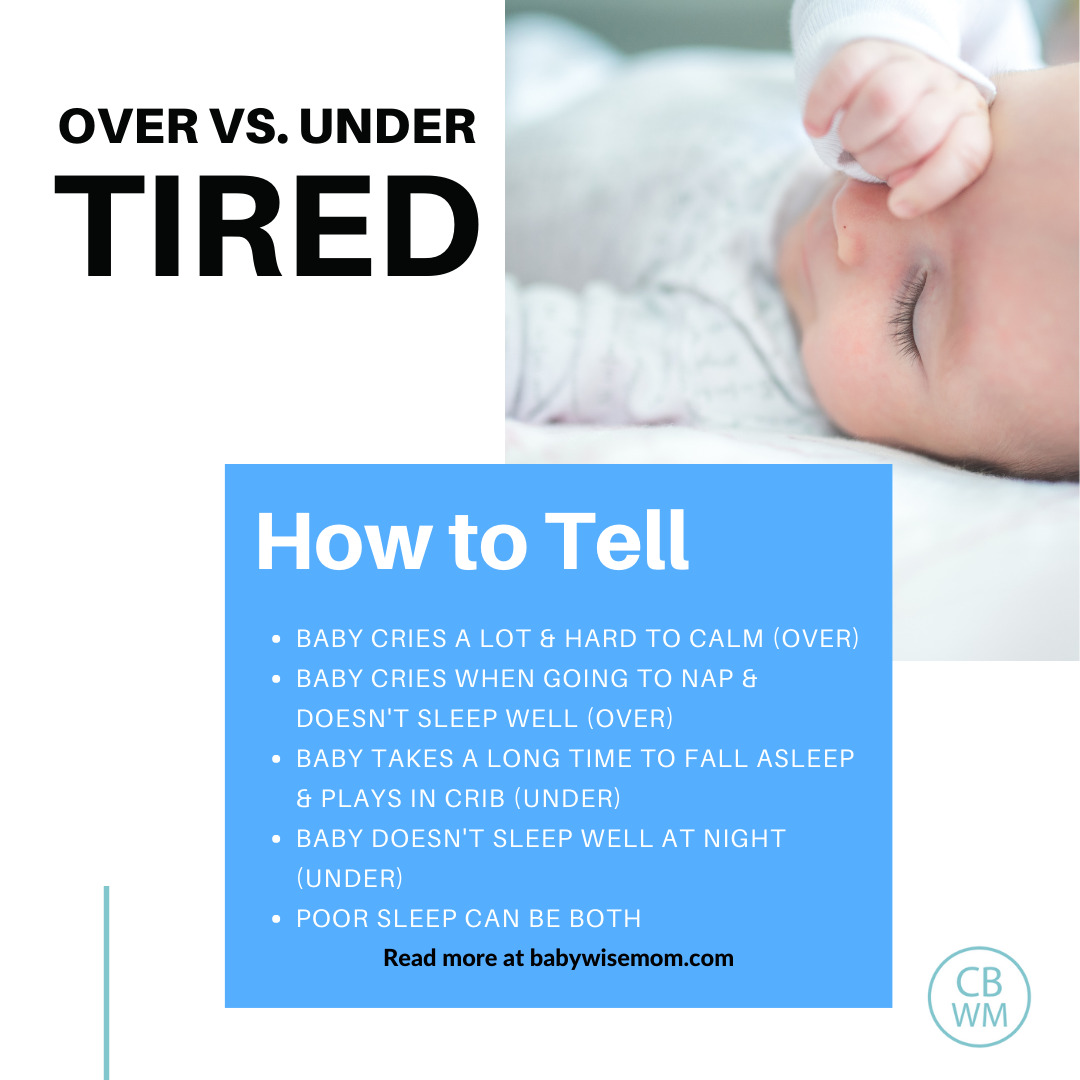
Overtired vs. Undertired
There are clues you can use to help you figure out if baby is too tired or not tired enough.
Look at Disposition
Generally, an overly tired baby will be quite fussy while a baby who just isn’t tired enough will start out pleasant.
Your overly tired baby will be fussy during playtime and just seem like she has had too much. She will likely cry from the beginning of nap and cry quite hard.
The baby who is not tired enough will most likely be pleasant during playtime (unless he is completely bored). The undertired baby will often go down for a nap without protest, but can start crying 20-30 minutes later once he gets bored of the crib (and he won’t have fallen asleep yet).
Some undertired babies might be put down for a nap and start to cry right away. These babies realize they are being put down for a nap and know they aren’t ready. They get upset and offended that it is happening!
Look at History
One of my number one problem solving tips is to look at what has changed.
If your baby was taking great naps and doing well with the wake time length you had, then started having issues, you most likely need to extend that waketime length some.
Often you only need to add five minutes to that waketime to reach the new perfect length. Sometimes up to 10-15 minutes should be added.
>>>Read: Problem Solving Tip: What Has Changed?
If your baby has never taken great naps, you have more of a guessing game ahead of you. Try different wake time lengths, take notes, and see what works.
My Book of Logs will be very helpful to you in getting this right!
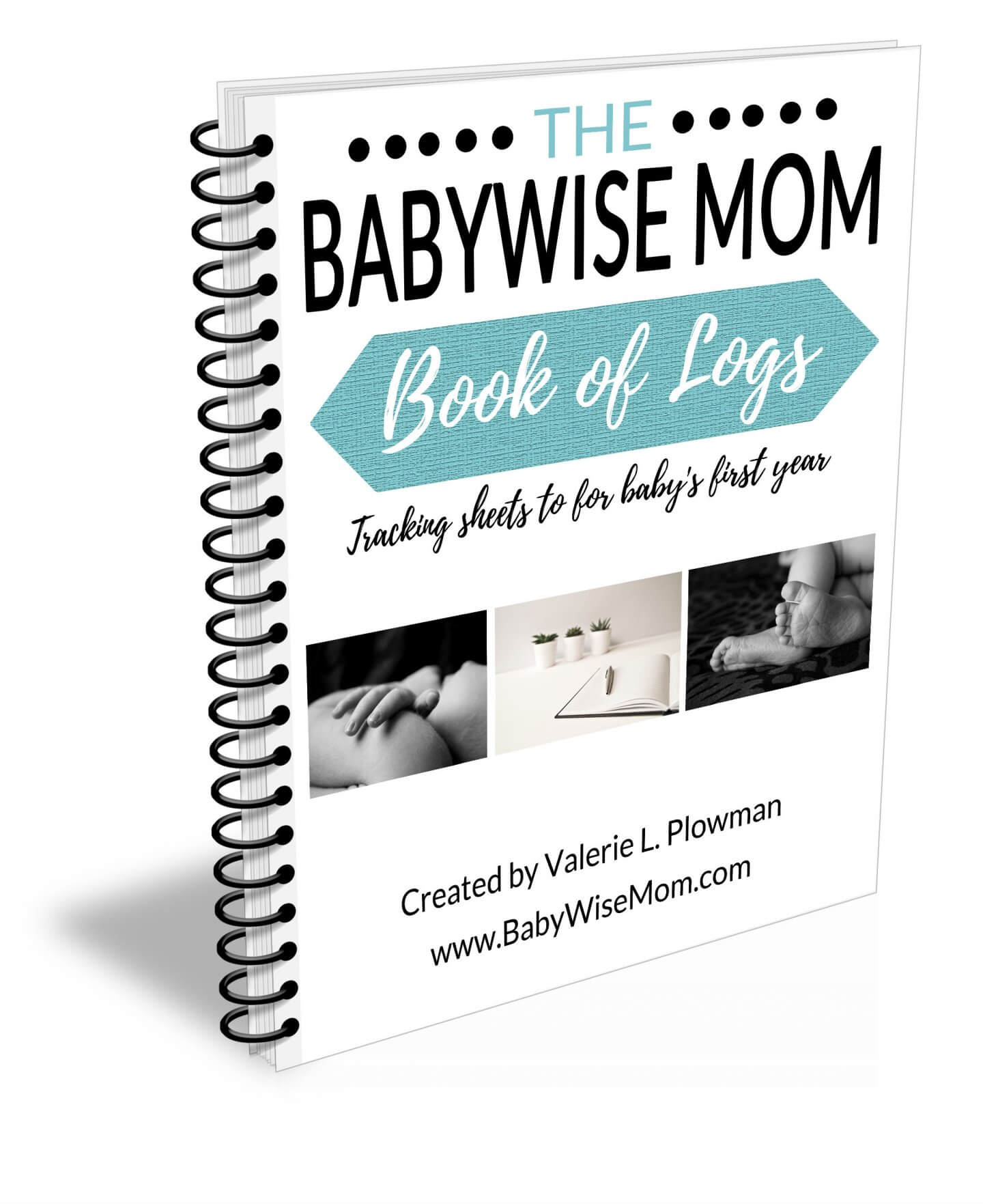
Look at Sleep Patterns
Finally, look closely at sleep patterns.
An overly tired baby will cry hard from the beginning of nap and then fall asleep, but in the end take a short nap. Some overly tired babies will crash and fall asleep immediately, but wake up crying after a short nap.
A baby who isn’t tired enough will play in the crib for a while before getting upset. The baby might cry right away, but not in a “I don’t know what to do with myself” way, but rather a “I can’t believe you just put me in my bed” way.
When wake time length is correct, your baby should fall asleep within 5-20 minutes (the length really varies from baby to baby, so be sure you pay attention and know what is normal for your baby).
Either way, naps and night sleep will be off.
Take note that if your baby hasn’t learned to sleep independently yet, these sleep rules won’t necessarily apply. A baby who can’t fall asleep unassisted will usually cry or play instead of falling asleep.
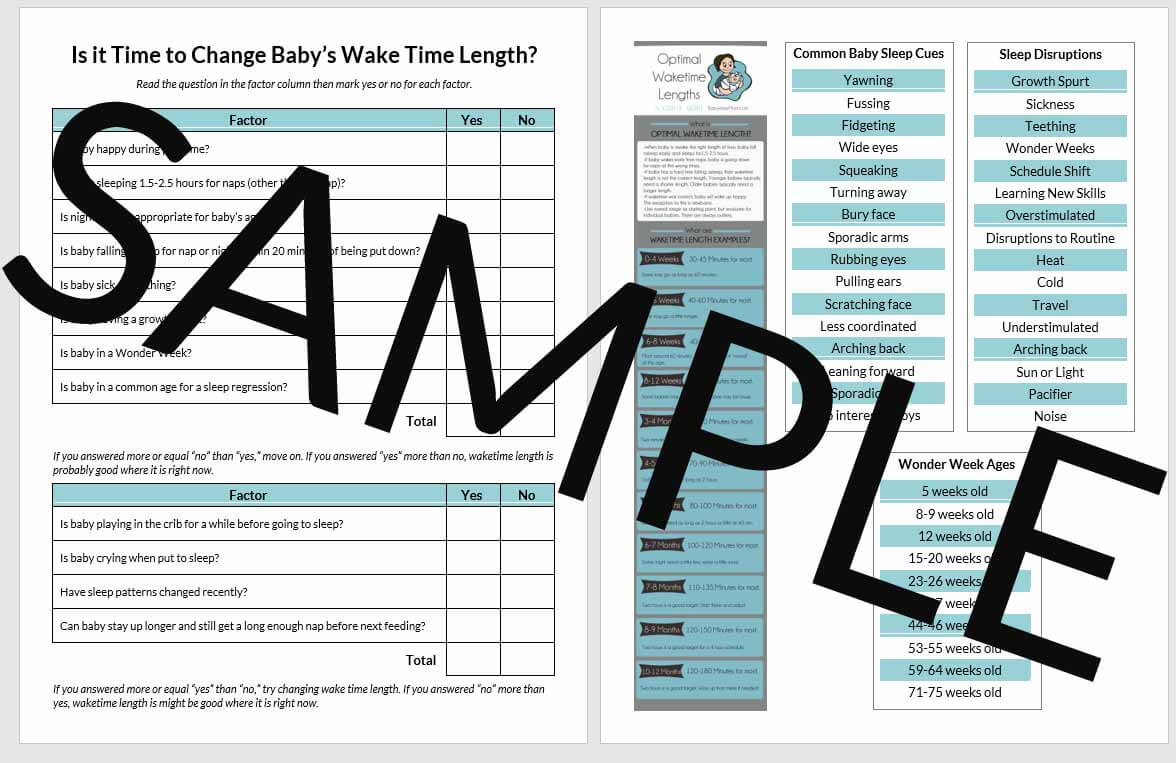
Be sure to check out my free Wake Time Length Worksheet to figure out if you should extend wake time or not.
What To Do If You Have an Overtired Baby
An overtired baby has been awake longer than she should have been. She has been awake longer than her body should be awake.
This leads to fussiness and poor sleep, which compounds the problem. This also activates the stress response. Your baby’s body will release hormones like cortisol and adrenaline. This makes it harder for the baby to fall asleep and stay asleep.
That means you need to step in and help out. If your baby is overtired, there are things you want to do to help baby be just right and be able to sleep independently.
Swaddle Baby
Swaddling can help baby immediately become more calm. It can also help baby sleep better since it prevents that Moro Reflex from waking baby up. A well-rested baby will be able to handle stimulation better.
>>>Read: How to Help Your Baby Sleep Better With Swaddling
Get Wake Windows Right
I cannot overstate how important accurate wake windows are to having a solid sleep schedule. If baby’s wake window (or wake time length) is correct, baby will not fight sleep.
This is such an important part of healthy sleep that I have a lot of help on the topic. Get to know your baby’s sleep cues (like eye rubbing, fussiness, red eyes, irritability, etc.) and get that waketime length and nap times correct. Start here: Optimal Waketime Lengths
Set Up a Solid Sleep Routine
A sleep routine can help your baby know it is time for sleep. It sets the stage to get your baby ready for sleep.
>>>Read: Sleep Routine Ideas to Get Your Baby Sleeping Well
Limit Stimulation for Your Baby
If your baby is overtired, it will be hard for him to sleep well. Sleep is vital to come out of this overtired hole. You want to limit stimulation in these situations so you do not create a vicious cycle.
You want to limit the noise, sights, sounds, and even smells to help your baby relax and be able to sleep. You might need to use blackout curtains to keep the room as dark as possible, also.
>>>Read: How To Calm Your Overstimulated Baby
Use Sleep Props to Calm, Comfort, and Get Baby to Sleep
While we try to avoid sleep props as a general rule, your first priority when baby is overtired is to get sleep to happen.
This is when you turn to sleep props to help calm newborns or babies and get them to sleep. Common ways to calm a fussy baby are with swaddle, shush (can be a white noise machine), swing, and suck.
You might put baby in the swing to catch up on sleep. You might use pacifiers to help baby sleep.
You can still develop healthy sleep habits even if you use sleep props at times. Read this for help and assurance:
>>>Read: When Sleep Props Are Okay (And When to Avoid Them)
Conclusion
It is not always easy to tell if your baby is overtired or undertired. If you still are not sure after reading these tips, decide which you think is most likely and act on that.
Work in 5 minute increments. Whether you think baby needs more or less wake time, change it by just 5 minutes a time and adjust from there.
You rarely would need to move beyond a 20 minute change at once, so if you find you are at 25 minutes or more, consider adjusting the other direction.
Make sure you take solid notes so you can look at the data all at once. Do not rely on your memory! My Book of Logs is an excellent resource for problem-solving.
Also, note that not all sleep problems are because of waketime length being off. If you have tried all of the above and things still aren’t good, check out my post The Complete Guide to Troubleshooting Short Baby Naps.
Related Posts
- Optimal Waketime Lengths
- When and How to Extend Baby’s Wake Time Length
- How To Accurately Calculate Baby Wake Time Length
- Tips Know When it is Time to Extend Baby Awake Time
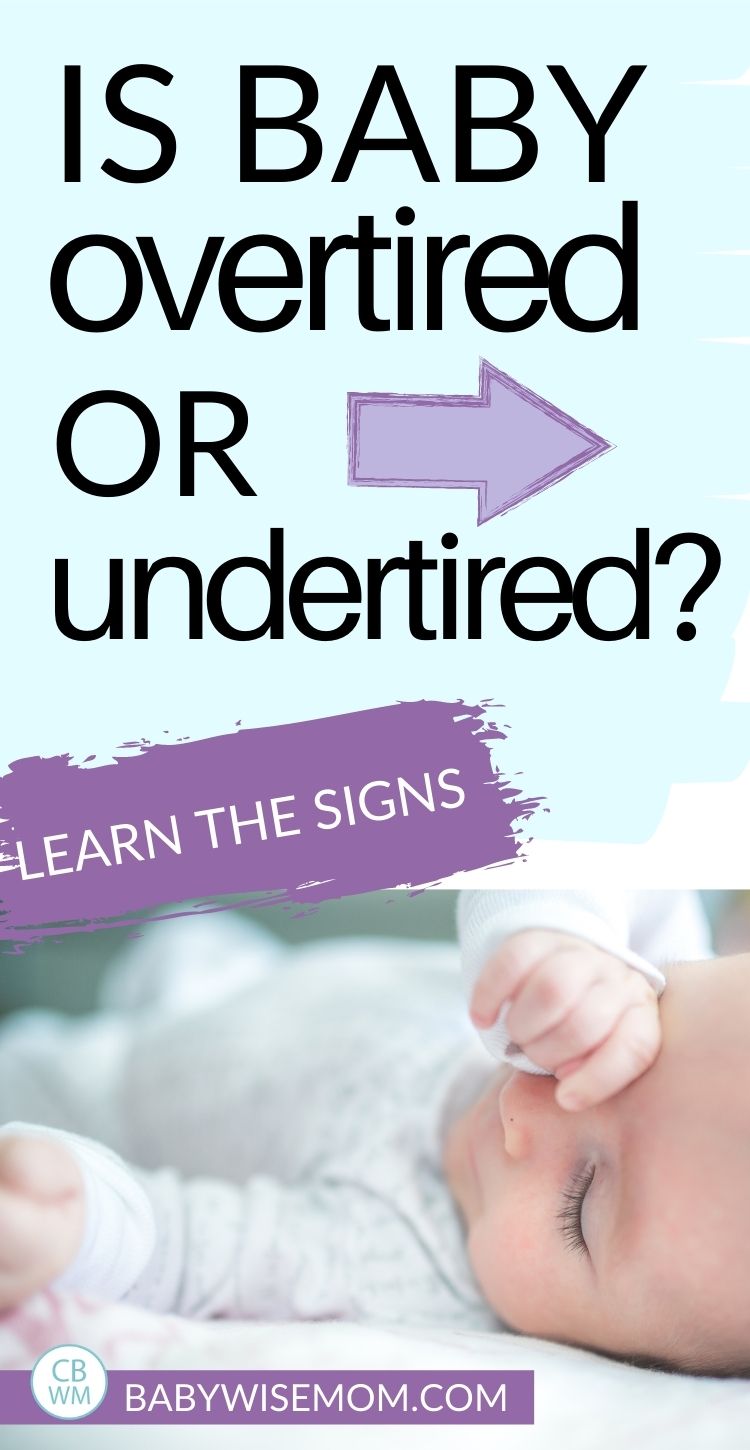
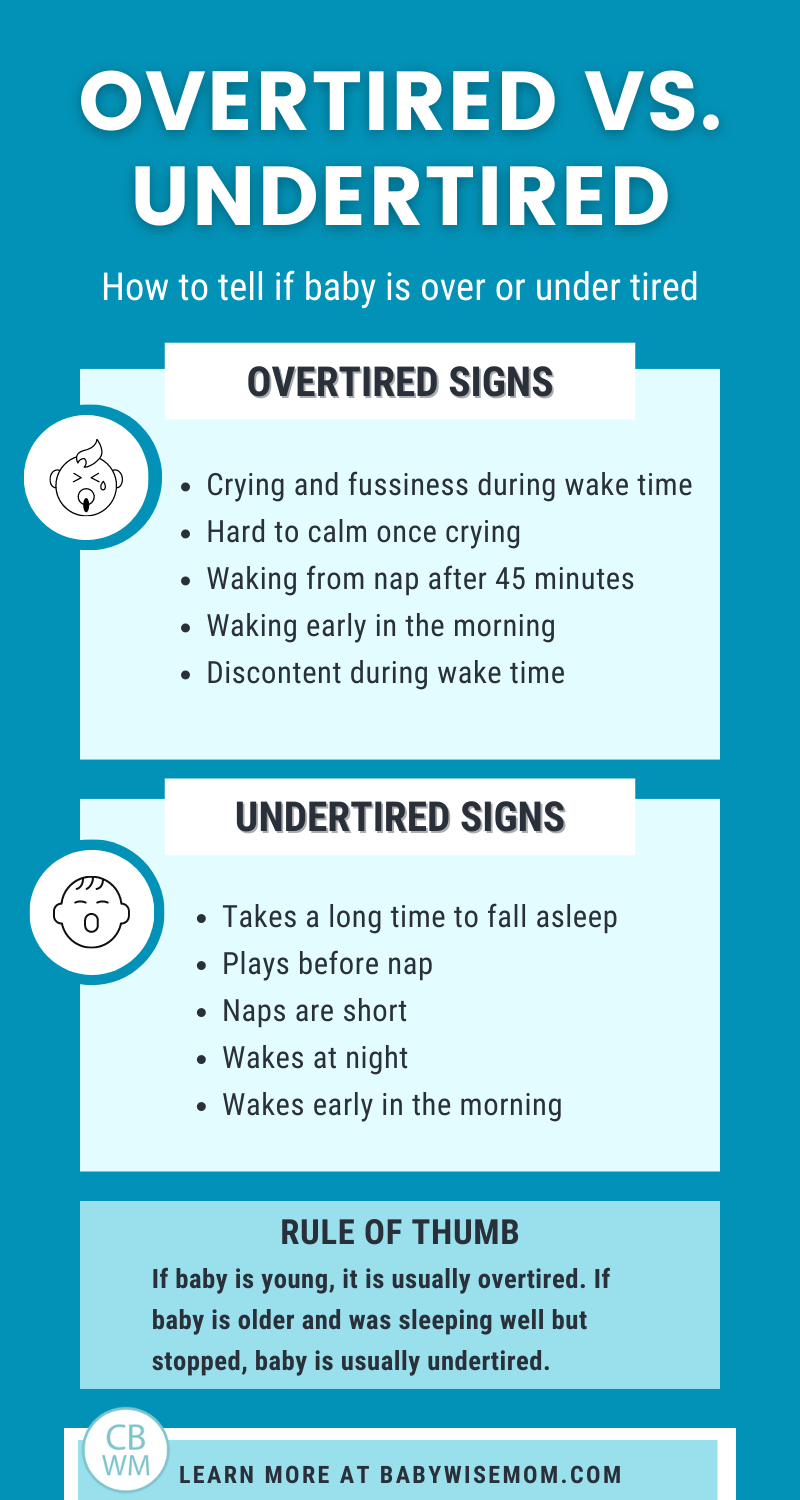
This post first appeared on this blog March 2021
